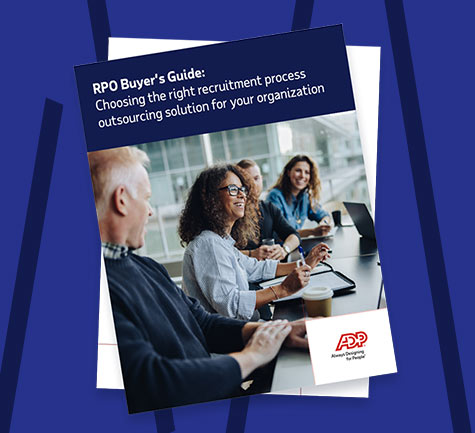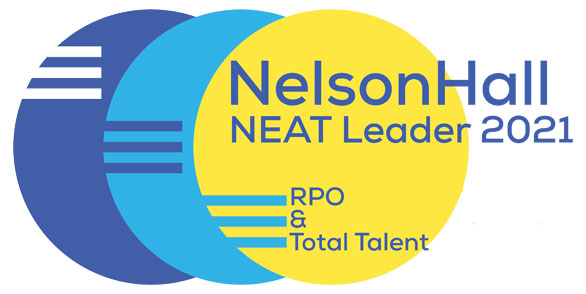What is recruitment process outsourcing?
RPO is the long-term transfer of ownership of all or part of an employer’s recruitment process to a third-party specialist. This business model allows organizations to scale resources as requisitions fluctuate so they can meet hiring demands without increasing budgets to pay for in-house recruiters or recruitment agencies.
What is an RPO provider?
An RPO provider acts as an in-house recruiter for a business, providing efficiency and flexibility to the recruitment process. It relieves employers and HR professionals of administrative burdens and delivers a seamless, high-touch experience for job candidates.
How does RPO work?
A comprehensive RPO partnership offers daily administration and big-picture, strategic guidance across the entire recruitment process from talent consulting to onboarding support. These services are typically underpinned by a flexible applicant tracking system (ATS). All sourced and recruited candidates are exclusive to the client and are not shared with any other clients.
What are the benefits of outsourcing recruitment?
At any time, but especially during rapid change, RPO can help employers maximize their budget and improve productivity and retention. Other benefits to outsourcing talent acquisition include:
- Reduced recruitment costs
Due to its scalability, among other factors, RPO may lead to hard and soft cost savings that multiply at a similar percentage each year. - Compliance support
RPO providers who can keep pace with changing regulations may build automated compliance support into all stages of recruitment. - State-of-the-art technology
Some RPO providers supply an ATS or will support their client’s existing technology so they can track candidate statuses, improve communication between employers and applicants, and deliver a positive hiring experience. - Faster time to fill
The right RPO provider will help identify barriers, continually tweak processes and ensure accountability so that positions are filled faster. - Decreased turnover
When hiring and onboarding processes are consistent and streamlined, new employees tend to be more engaged and less likely to leave the organization. - Diversified talent pools
RPO providers may have established partnerships with diverse organizations, networks and colleges that can help employers attract underrepresented talent. - Advanced analytics
Real-time data and benchmarks, both of which are generally available with RPO, can help guide an employer’s recruitment tactics.
RPO types
Organizations that outsource recruitment typically leverage an in-house team, a contractor model or (most commonly) a combination of the two. Blended models can be particularly advantageous for employers whose hiring needs fluctuate throughout the year.
RPO pricing models
Employers generally pay for RPO in one of the following ways:
- Cost-per-hire
Businesses pay a fixed cost per hire for different levels of positions. - Cost-per-resource
Each resource assigned to a client is billed at a fixed monthly rate. - Hybrid
Blended models combine cost-per-hire and supplemental, resource-based pricing. - Transaction-based
Employers are charged for each interview, background check, etc.
Of these options, most employers prefer the cost-per-hire model because of the flexibility it affords. As hiring volumes increase or decrease, so do recruitment expenses. Cost per transaction, on the other hand, can be expensive for businesses that process a high number of candidates.
How do employers know if RPO is a good fit for their business?
When considering RPO, employers must carefully evaluate their people, processes and technology. If any of the following challenges are uncovered during the assessment, outsourcing recruitment may be warranted:
- Limited hiring team bandwidth
- Decentralized or inefficient processes
- Seasonal hiring demands
- Compliance risks
- High recruitment costs
- Lack of specialized recruitment expertise
- Organic growth, mergers, acquisitions or expansions
- Lack of data and reporting capabilities
- Limited applicant tracking system functionality
Choosing an RPO provider
Once employers have identified their recruitment and talent needs, they can begin the RPO selection process. The ideal provider generally will:
- Offer consultative and innovative solutions
- Customize programs to meet unique needs
- Align with the client’s mission and culture
- Have global security capabilities
- Understand talent market trends
- Leverage data to deliver proven results
- Scale with organizations as they grow
Additional questions about RPO
What is the difference between MSP and RPO?
RPO is specific to recruitment outsourcing, whereas a managed service provider may handle recruitment, as well as payroll, benefits administration and other HR responsibilities on a client’s behalf.
What is the difference between RPO and BPO?
Business process outsourcing, like managed services, is a broader form of outsourcing than RPO. It may include HR capabilities, but is not limited to them. Clients that opt for BPO may outsource marketing, tech support, customer service and more.
What do RPO companies do?
RPO providers offer strategic guidance and day-to-day support where needed across the entire talent acquisition process. Specific examples include job postings, resume review, interviews, market analysis, niche recruiting and more.
How much does RPO cost?
RPO pricing models are dependent upon scope of work, hiring volumes, hiring fluctuations, locations, position requirements, timing and resource requirements. When evaluating cost, it’s important for employers to understand all ancillary fees and determine how the price structure may impact their overall recruitment budget.
This guide is intended to be used as a starting point in analyzing RPO and is not a comprehensive resource of requirements. It offers practical information concerning the subject matter and is provided with the understanding that ADP is not rendering legal or tax advice or other professional services.






